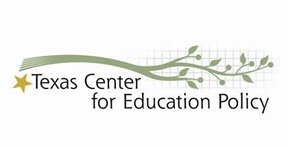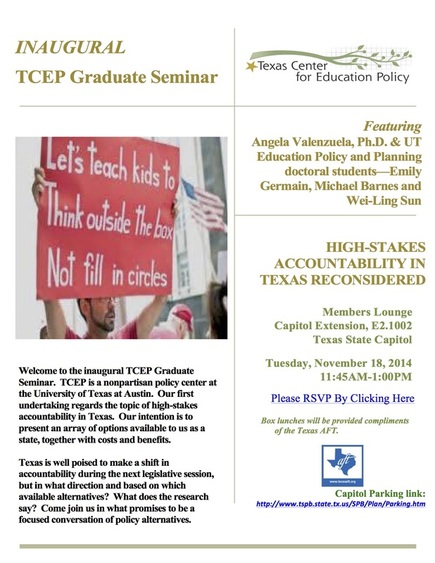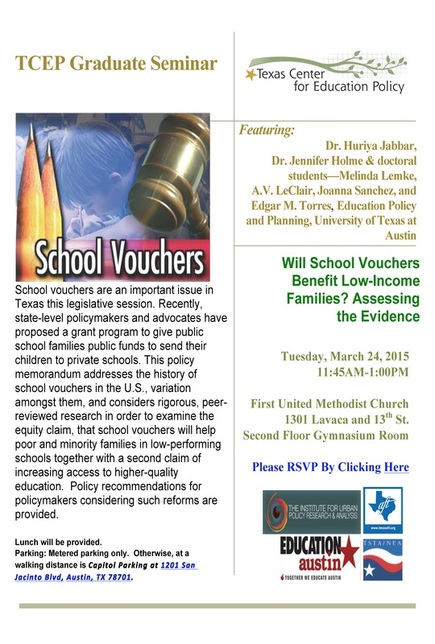
TCEP Graduate Seminar
Initiated by our graduate students in the Education Policy and Planning program at the University of Texas in Fall 2014, the TCEP Graduate Seminar is a mentorship opportunity involving faculty and graduate students from throughout the Department of Educational Administration at the University of Texas at Austin. The TCEP Seminar consists of faculty working with graduate students to write policy briefs, memoranda, or reports that are germane to policy agendas and debates in the Texas State Legislature and beyond. They work together to develop constructive, research-based, policy alternatives that then get vetted in public forums before statewide audiences such that the seminar not only creates a space for focused policy deliberations, but most especially, allows us at the university to receive and incorporate critical feedback to our arguments and evidence so that we can collectively work to develop sound educational policy.
As with all TCEP activities, the seminar also acquaints our graduate students with policy makers, legislators, legislative staff, and advocacy communities statewide. It also specifically encourages students to testify, evidence in hand, in the Texas State Legislature. We are proud to say that during the 84th 2015 Texas State Legislative Session, at least six of our graduate students experienced testifying in committee hearings.
I know that our testimonies make a difference. Research matters to a lot of people, particularly when they get it from a credible source like the University of Texas. To consider this more, I encourage you to read the interview below that addresses the value that we as scholars with studied opinions add to high-stakes environments like the Texas State Legislature.
As with all TCEP activities, the seminar also acquaints our graduate students with policy makers, legislators, legislative staff, and advocacy communities statewide. It also specifically encourages students to testify, evidence in hand, in the Texas State Legislature. We are proud to say that during the 84th 2015 Texas State Legislative Session, at least six of our graduate students experienced testifying in committee hearings.
I know that our testimonies make a difference. Research matters to a lot of people, particularly when they get it from a credible source like the University of Texas. To consider this more, I encourage you to read the interview below that addresses the value that we as scholars with studied opinions add to high-stakes environments like the Texas State Legislature.
Inaugural TCEP Graduate Seminar
Here is the policy memorandum that was a product of the inaugural TCEP Graduate Seminar held on November 18,2014. It is titled, “High-Stakes Accountability in Texas Reconsidered,” co-authored by Dr. Angela Valenzuela, Wei-Ling Sun, Michael Barnes, and Emily Germain.
Our brief was in fact taken into consideration with respect to a proposal leading to what became SB 149. Authored by Kel Seliger, SB 149 was fast-tracked and ultimately signed into law. This law allow some high-achieving high schoolers to graduate even if they don't pass these tests. It does this by establishing an alternative method for allowing high school seniors that have not passed an end-of-course (EOC) exam intended to satisfy state graduation requirements. This alternative method involves the establishment of an individual graduation committee (IGC) comprised of the following: The principal or their designee; the teacher of the course connected to the EOC exam that the student failed to pass; the student’s school counselor; and the student’s parent or guardian, designated advocate, or the student himself/herself if they are 18 years or older. Depending on the student, the IGC could recommend remediation or render a decision of the students' competency in a course based on a project or portfolio that demonstrates their proficiency in the subject area that corresponds to the the EOC exam that they failed. |
TCEP's Second Graduate Seminar
|
School vouchers were an important issue in the Texas State Legislature during the 84th 2015 biennial legislative session. State-level policymakers and advocates had earlier proposed a grant program to give public school families public funds to send their children to private schools. Proponents have argued that school vouchers will save the state money, generate healthy competition between traditional and private schools, and remedy unequal access to high quality schools caused by racial segregation. Opponents argue that voucher policies will draw away much-needed funds from public schools and are the first step in a broader effort to privatize public schools.
This policy memorandum titled, "Will School Vouchers Benefit Low-Income Families? Assessing the Evidence," was authored by Dr. Huriya Jabbar, Dr. Jennifer Jellison Holme, and doctoral students Melinda Lemke, A.V. LeClair, Joanna Sanchez & Edgar M. Torres—all either faculty or graduate students in the Education Policy and Planning program. This policy memo assesses the evidence regarding this claim. The authors provide a brief history of school vouchers in the U.S. and then describe the different types of voucher programs that exist, and the variation amongst them. Next, they review rigorous, peer-reviewed research on who uses vouchers and their effects on low-income and minority students. Finally, based on this evidence, they provide policy recommendation for policymakers considering such reforms. Melinda Lemke and I took this policy memorandum and testified on Senate Bill 4 on March 26, 2015, the most important hearing on vouchers during the last legislative session. We ended up being the last to testify, making it all a fairly dramatic experience. After the hearing ended, two Senators stepped down from the dais after the hearing was over to specifically tell us that the testimony throughout the day was confusing. They said that they were happy to get "credible information" and that they would read every word in the memorandum. Although many factors are always at play, I am confident that our testimony made a difference in defeating the different voucher bills that were heard together that day. |

